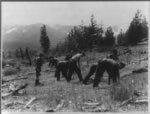
One of the first New Deal programs President Franklin D. Roosevelt signed into law in the spring of 1933 was the Civilian Conservation Corps (CCC). This voluntary federal program was designed to put young men back to work during the depression, and at the same time, contribute to forest management, flood control, various conservation projects and the development of state and national parks, forests and historic sites. The CCC put over three million men, typically ages 18-25, to work over the course of its nine year run.1
It brought young men (and only men at the time), from all over our country together to work for a common goal: to better understand and then improve our environmental infrastructure. By its very nature, the CCC allowed our country’s youth to see what tangible good could be achieved when we worked together to protect and improve our natural resources. In short, it was one of the most successful government programs ever implemented and is a case study for future programs of that ilk.
Although much has been written about the CCC, the historian, Neil Maher, wrote a book about the program: Nature's New Deal: The Civilian Conservation Corps and the Roots of the American Environmental Movement. His book places the CCC at the start of our country’s environmental awakening.
Spend a few minutes listening to Dr. Maher’s interview with the PBS American Experience program via the link directly below, and check out the additional information provided about the CCC. His discussion is fascinating.
https://www.pbs.org/wgbh/americanexperience/features/author-interview-neil-maher/
Today, we have a chance to reimagine the Civilian Conservation Corps. President Biden issued an Executive Order proposing the creation of the Civilian Climate Corps within a week after taking office, and a few progressive thinkers in Congress have introduced bills to create and fund this new government program. It was also slipped into the President’s Build Back Better Plan. This updated CCC calls for the nation to come together to help mitigate the ravages of climate change. According to The Sunrise Movement, a non-profit dedicated to reversing climate change:
The Civilian Climate Corps is a visionary policy that would create a government jobs program putting a new generation of Americans to work combatting the climate crisis… More specifically, it’s a program organized through the Departments of the Interior and Agriculture and aims to “conserve and restore public lands and waters, bolster community resilience, increase reforestation, increase carbon sequestration in the agricultural sector, protect biodiversity, improve access to recreation, and address the changing climate.”
All laudable goals, and ones that are crucial to begin working on immediately, but the creation and funding for this generation’s CCC was cut from the climate bill, renamed the Inflation Reduction Act, recently signed into law by President Biden. Nevertheless, the President has moved forward with a plan to plant one billion new trees to help defray the loss of forests from the recent mega-fires ravaging the western U.S.
It’s interesting that those who study history and thus respect its power, most clearly see the need to resurrect and reimagine the successful government programs of the past, particularly one of the most successful, the Civilian Conservation Corps, and adapt it to our current needs. It turns out that Dr. Neil Maher, whose book and talk are mentioned above, advocates for the Civilian Climate Corps to move forward.
But it’s not just creating millions of jobs that pay a living wage, providing full health insurance and directly working to reverse climate change that makes the creation of the Climate Corps essential, it is the sense of community it will foster when people from diverse backgrounds come together to work toward a single goal, particularly when that goal is not a military one. We might realize how vital it is that we come together as a country to achieve a common good, that we should stand together rather than fall, bitterly divided. I’ve discussed in previous posts the need for a national public service campaign of some sort to help unify our country, and I’m far from the only one who feels this way.
Last year when President Biden first proposed the Civilian Climate Corps, a New Yorker piece said it was an idea the entire country could get behind.
But the potential of this idea, if the record of the original C.C.C. is any guide, goes far beyond the advertised purposes. A modern-day C.C.C. could be an attention-getting reminder of something that a great many Americans seem to have forgotten: the capacity of government to be an instrument of the common good.
I’d love to hear your thoughts on this proposed new government program, the Civilian Climate Corps. Please leave your ideas in the comment section below. Let ‘er rip!
And speaking of communities, you can also become a participating member of the Crime and Punishment community by signing up right now for a free or paid subscription. Thanks in advance for your support!
Note: Both of these pieces are from the National Park Service.
https://www.nps.gov/thro/learn/historyculture/civilian-conservation-corps.htm
https://www.nps.gov/articles/the-civilian-conservation-corps.htm













Share this post